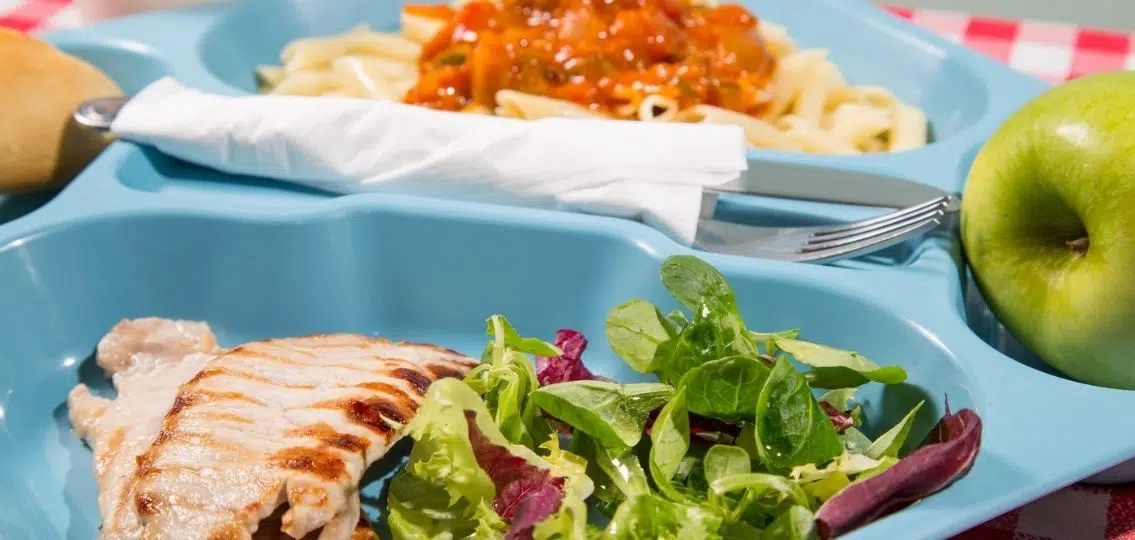Let’s face it: our teens are busy. On top of school and homework, they have extracurricular activities and part-time jobs, not to mention their active social lives. With all the pressures they’re juggling, it’s no wonder that they struggle with healthy eating habits as much as we do as parents. But good food is crucial for adolescents who are undergoing a myriad of developments, and it helps them perform at their best—academically, physically, and emotionally.

The good news is, there are things we can do to improve our teens’ nutritional habits. (And these tips can benefit parents, too!)
5 Ways to Encourage Healthy Eating Habits
1. Make it as simple, easy, and realistic as possible
Convenience plays a big role in what people choose to eat. For teens, one of the barriers to healthy eating is a busy schedule. Stock plenty of quick, but healthy, foods and put them within easy sight. We’re more likely to try what we see, so consider storing healthy snacks in clear containers. Try putting out some fruit, nuts, cheese sticks, beef jerky, or veggie sticks with peanut butter before your teen comes home from school or when they bring their friends over.
Keeping things simple makes healthy eating more likely and sustainable—not just for your teens but for you as well.
2. Keep in mind changing preferences
One thing to remember when helping your teens eat healthier is that their tastes and interests will change as they get older. Tweens might be happy eating whatever foods you offer them, while older teens might develop new tastes or dietary preferences, such as vegetarianism or veganism. Making healthy food available that fits their new choices will help ensure that they won’t subsist on potato chips or cookies just because those are the only vegan items in the house.
3. Assess your own situation, needs, and abilities
The key to healthier eating is to make small, sustainable changes. Healthy food doesn’t have to be expensive or organic. Your emphasis should be on colorful, fresh, and minimally processed foods. Healthy, but affordable, options include canned and frozen goods that don’t have sweeteners or additives.
Prepping meals once a week, or even just once or twice a month, can save time. To save even more time, choose healthy pre-cooked ingredients for your meal prepping, such as canned beans, meats, and vegetables.
In many households, certain foods and types of cooking are a part of a family or cultural tradition. In these situations, it’s not about completely changing the way you cook and eat but finding ways to make small adjustments that honor tradition while also making your meals a little bit healthier. For example, you could substitute low-sodium soy sauce for regular soy sauce. Or if a family recipe calls for deep frying you could try baking as an alternative method and achieve similar flavors and textures.
4. Model healthy eating and start early
Keep in mind that our positive eating behaviors can have a major influence on our children. When we get our recommended daily servings of fruits and vegetables, our children are more likely to as well.
Likewise, eating preferences are developed early in childhood and can persist well into teen and adult years. The earlier you help your kids develop healthy eating habits, the more likely they’ll stick to them and turn them into sustainable practices. But it’s never too late to start eating healthier, so don’t be discouraged if you feel like you didn’t do enough when your kids were younger.
5. Offer encouragement—and relax
The benefits of healthy eating are their own reward. As parents, the best we can do is give our teens healthy options and offer encouragement and positive reinforcement for making good choices. This is a time when they are developing their own identities and desire for independence, so they won’t always make the right choices when they’re reaching for a snack or grabbing a quick meal with friends. But by modeling good habits and increasing their awareness of what a healthy diet looks like, you are doing everything you can to make sure they make informed nutritional choices. So when you give your teen a proverbial pat on the back for eating healthy, don’t forget to give yourself one too.





